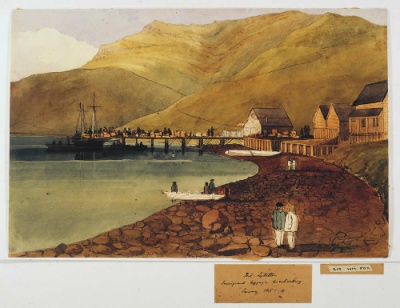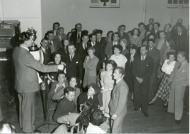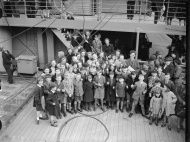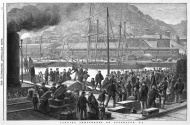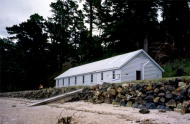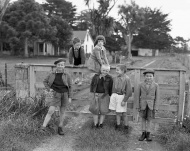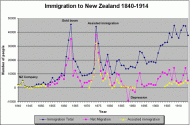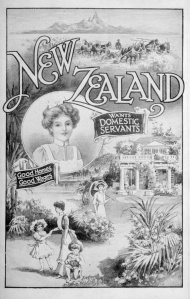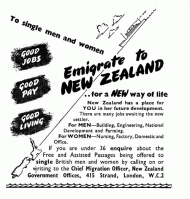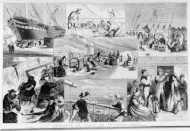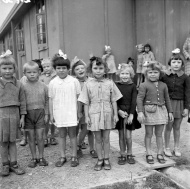Events In History
-
 16 June 1971Polynesian Panther Party founded
16 June 1971Polynesian Panther Party foundedThe Polynesian Panther Party was founded in Auckland by six young Pacific Islanders: Paul Dapp, Will ’Ilolahia, Vaughan Sanft, Fred Schmidt, Nooroa Teavae and Eddie Williams. The group included Samoans, Tongans, Cook Islanders, and a few Māori. Read more...
-
 6 September 1948New Zealand citizenship established
6 September 1948New Zealand citizenship establishedThe British Nationality and New Zealand Citizenship Act 1948 (the order of the terms showed their relative importance) gave New Zealand citizenship to all current residents who had been either born British subjects or later naturalised. Read more...
-
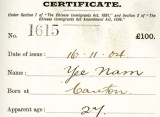 15 December 1944Poll tax on Chinese immigrants abolished
15 December 1944Poll tax on Chinese immigrants abolishedThe Finance Act (No. 3) 1944 abolished the poll tax introduced in 1881, which was described by Minister of Finance Walter Nash as a 'blot on our legislation'. Read more...
-
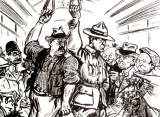 9 November 1920White New Zealand policy introduced
9 November 1920White New Zealand policy introducedThe Immigration Restriction Amendment Act 1920 required intending immigrants to apply for a permanent residence permit before they arrived in New Zealand. Read more...
-
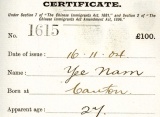 5 July 1881Poll tax imposed on Chinese
5 July 1881Poll tax imposed on ChineseParliament passed the Chinese Immigrants Act, which introduced a ‘poll tax’ of £10 (equivalent to nearly $1700 today) on Chinese migrants and restricted the number allowed to land from each ship arriving in New Zealand. Read more...
-
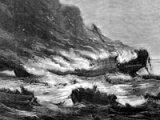 18 November 1874Cospatrick fire kills 470
18 November 1874Cospatrick fire kills 470En route to Auckland laden with immigrants, the Cospatrick caught fire off the Cape of Good Hope. The tragedy has been described as New Zealand's worst civil disaster. Read more...
Articles
British & Irish immigration, 1840-1914
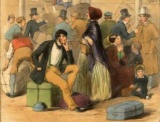
Who were the ancestors of Pākehā New Zealand? Where did they come from and what sort of people were they? These are some of the questions which this feature sets out to answer.
-
Page 2 – Overview - immigration to New Zealand 1840-1914
Overview of immigration trends 1840-1914
-
Page 3 – Where did they come from?
The composition of the inflow from Britain and Ireland was quite different from the composition of the United Kingdom as a whole.
-
Page 4 – English immigrants
Table and graph showing which part of England immigrants to New Zealand came from.
-
Page 5 – Scottish immigrants
Table and graph showing which part of Scotland immigrants to New Zealand came from.
-
Page 6 – Irish immigrants
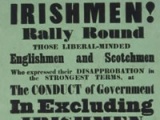
Table and graph showing which part of Ireland immigrants to New Zealand came from.
-
Page 7 – Where did immigrants move to?
British-born population living in New Zealand provinces in 1871.
-
Page 8 – Who were the immigrants?
Graph of figures taken from the death certificates of British and Irish immigrants to New Zealand (which include information on the father's occupation).
-
Page 9 – Conclusions about immigration 1840-1914
These statistics suggest some larger conclusions about the character and values of New Zealand's founding Pākehā population
-
Page 10 – Further information
Further sources relating to British and Irish immigration to New Zealand, including pdfs of more detailed information and statistics
Assisted immigration, 1947-75
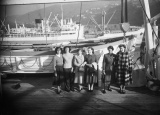
New Zealand is a country of immigrants. Wave after wave of peoples have settled here: Polynesian, British, European, Asian.
-
Page 2 – Peopling New Zealand
The Labour Department was responsible for setting up and administering the assisted immigration scheme
-
Page 3 – Leaving the grey UK
The Immigration Branch needed to advertise the assisted immigration scheme as widely as possible and mostly used the classified sections of British newspapers.
-
Page 4 – The voyage out
The Captain Cook, along with the Captain Hobson, brought assisted immigrants to New Zealand via the Panama Canal from 1952.
-
Page 5 – Life in New Zealand
After they arrived, each assisted immigrant was given a letter of welcome from Bert Bockett, the Secretary for Labour, which outlined the assistance which the Department would
The Vogel era

In 1870, Colonial Treasurer Julius Vogel launched the most ambitious development programme in New Zealand’s history. The ‘Vogel era’ was a decisive moment in New Zealand’s 19th-century transformation from a Māori world to a Pākehā one.
-
Page 3 – Vogel's vision
In June 1870, Vogel unveiled the most ambitious public works and assisted-immigration programme in New Zealand’s history.
-
Page 4 – Building Vogel's railways
Julius Vogel wasn’t the first colonial politician to promise to fund public works and immigration with borrowed money. But the early 1870s offered better prospects for success
-
Page 5 – Vogel's legacy
After the initial enthusiasm of the 1870s, Julius Vogel’s reputation suffered in the 1880s when New Zealand’s economy slumped into a long depression that was triggered by an
The dawn raids: causes, impacts and legacy
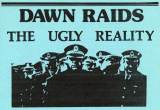
The 1974-6 dawn raids have been described as ‘the most blatantly racist attack on Pacific peoples by the New Zealand government in New Zealand’s history’
- Page 1 - The dawn raids: causes, impacts and legacyThe 1974-6 dawn raids have been described as ‘the most blatantly racist attack on Pacific peoples by the New Zealand government in New Zealand’s
Dominion status

On 26 September 1907 the colony of New Zealand ceased to exist. It became, instead, a dominion within the British Empire.
- Page 6 - New Zealand in 1907What was New Zealand like when it became a
Related keywords
- pacific peoples
- religion
- railways
- julius vogel
- economy
- public works
- communications
- assisted immigration
- maori land
- telegraph
- provinces
- land confiscation
- disasters
- oral history
- english
- race relations
- citizenship
- sport
- dominion day
- school journal
- dominion of new zealand
- lyttelton
- painting
- canterbury association
- immigrants
- settlers
- six oclock swill
- wellington city
- shipping
- children
- newspapers
- film
- advertising
- quail island
- antarctica
- robert scott
- historic places
- quarantine
- polish
- pahiatua
- australia
- goldfields
- cartoon
- police
- dawn raids
- new zealand company
- servants
- new zealand house
- domestic staff
- housing
- british
- health
- scottish
- irish
- poster
- racism
- transport
- workers rights
- agriculture
- chinese
- mining
- welsh
- gold
- british empire
-
Main image: Port Lyttelton immigrants, 1851
Port Lyttelton Immigrants disembarking, January 1851

